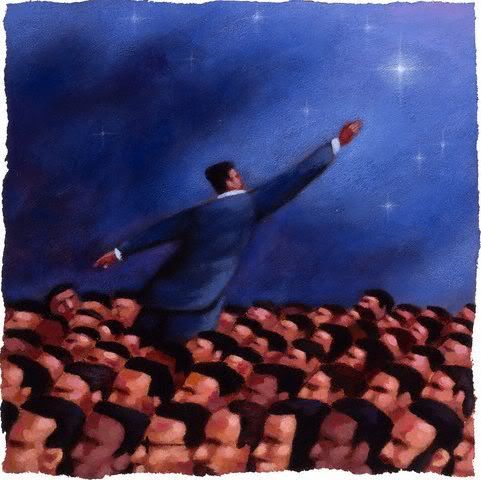
I’m continuing yesterday’s post on this subject because
it continues to be a one that brings otherwise powerful
leaders and experts to their knees.
Yesterday, I put forth the contention that the first step
in getting over the fear of speaking is to stop saying you
are afraid of public speaking–because that’s not accurate.
What you are afraid of is being humiliated–and I outlined
five contributors to this mind-gripping terror. Today,
I am going into some depth with each one. I would love
to hear which one you find has contributed most to your
fears–and what solution you are committed to engaging
so that you get out there with your message!
The 5 Contributors to Fearing Being Humiliated
When Public Speaking
1. We’ve been humiliated publicly. This first issue
is a deep one. We have a primordial reaction to being
shunned publicly—perhaps because throughout history
it has so often meant being ostracized from our clan and
facing life alone. And when it happens to us as a child,
before we’ve learned to engage our reasoning mind to
disengage from our emotionality, the stain of humiliation
can seem permanent. But only if we allow it to be. As
Eleanor Roosevelt so aptly put it, No one can make you
feel inferior without your consent. And no event defines
who you are unless you let it. You can choose to allow
an experience to define your fragility; you can choose
to allow the past to define your future—but that’s a choice
you’re making. Know that you don’t have to keep yourself
safe anymore. You can handle anything. (See an up-coming
post about my own humiliation years ago.)
2. We’re self-focused, rather than audience-focused.
Rather than giving to the audience, we’re focused on
getting approval from them—which leads to a strong
need to be perfect. Here’s the rub: if we must be perfect,
we’re going to fail because—sit down, if you need to—
we’re not ever going to be perfect. If we feel we must
be perfect but we never will be perfect, we’re in quite
a spot, aren’t we? And ultimately,we know that, which
is what a great deal of the fear is about. So how do you
stop needing to be perfect before an audience? Adjust
your purpose from“needing to get” to “needing to give.”
In the New Paradigm, you are (among many things)
involved with your audience in such a way that you are
not the star, they are. I teach that you are a teacher,
not a speaker, and that shift creates a significant change
in how you view yourself. When you’re there to give
(as teachers are), your self-importance vanishes, and
it is self-importance that fuels fear. You aren’t important,
they are.
Another note on this: it’s also worth accepting that
you’re never going to please everyone. Someone in the
room won’t like you. The question is, Can that be okay
with you?
If it can’t be…why?
Try this tack, too: ask yourself, what’s the worst that
can happen if I forget something—or everything? If the
audience gets up and leaves after the first 10 minutes?
Go through the process of questioning yourself with this.
Answer it the first time. If I forget what I want to say,
the worst thing is I won’t be asked back to speak. And
what’s the worst thing that could happen from that? I’ll
have to find a new group to speak to. And the worst
thing from that? You’ll find, that “the worst”…isn’t.
Finally—if you aren’t perfect? Be self-effacing right
in the moment. People love when speakers acknowledge
their own “mistakes.” Not doing so, however, allows the
awkwardness to “sit in the room,” which isn’t good energy
-management. So, make a joke about yourself and move
on. Your audience will feel what you feel, so the more
confidently and nonchalantly you handle an embarrassing
moment, the more confident they will feel about what you
did, as well.
3. We simply aren’t prepared. Needing to practice
is Public Speaking 101, right? Not for many, many
speakers (especially those who like being in front of
groups; they think their comfort level makes them good,
and often they don’t bother to practice at all.) But even
those who fear speaking don’t realize the incredible power
of knowing their material cold. The greatest fear comes
from not knowing it; that your brain will go blank. So,
practice! Practice in the shower, in the car, doing dishes—
wherever you can. You will walk on the (proverbial) stage
as if you own it when you know your stuff.
4. We’re mimicking “old school” speakers and
presenters. The New Paradigm techniques I teach
tend to mitigate fear because they are so much about
creating energy in the room and being empowered and
self-expressed. But let me share some Old Paradigm
techniques that tend to perpetuate fear: 1) Opening
with your name and a “thank you for coming”—the
first puts an emphasis on you, which will only augment
the fear you already have, and the second puts you in
the weak position of appreciating the audience for taking
the time to list to you—and that insecure stance can
perpetuate fear; 2) “Pouring” information at your
audience from a distance, while they listen quietly—again,
this emphasizes you and your material, which will
increase trepidation and the need to get it right; 3)
Believing you must present yourself as serious and
intellectual—“having to be” anything is going to rattle
your nerves, but feeling you need to appear“important”
is going to send you over the edge; and finally, 4)
Standing behind a podium— physical blockades
symbolize emotional blockades; the more physical and
emotional distance between you and your audience, the
more nervous you are going to be. Get out from behind
the block and close to your audience.
5. We’re unsure about the value of our message.
Other than being unprepared, little can make us as
nervous as being unsure if others want to hear our message.
I’m not going to give you a pep-talk here; I’m going to
be blunt: make sure it is something they want to
hear. Know your audience. Then, make sure that you
really are giving value. A lot of speakers don’t! They
speak above or below their audiences; they provide
cliché material; they don’t help the audience to see
how it’s valuable in their lives. If you’re nervous about
the value of your message—it may be worth a look. On
the other hand, when you know that you’re giving
extreme value to your audiences, you’ll be chomping
on the bit to give it to them and your nerves will be
jumping for other reasons! That goes back to the giving
vs . getting issue: If you’ve got value to give but you’re
still more focused on getting their approval, fear will
nail you. But giving great value because you can’t wait
to give it? You’ll be irrepressible!
I truly hope these ideas have given you food for thought
because you have a message to get out there!! You cannot
give fear the power any longer. Take over, take control.
Recognize, again, that it is humiliation you fear, not
public speaking.
So, what’s the worst thing that can happen to you if you’re
humiliated? Really dig deep with yourself there and you’ll
find that the “worst” is simply not worth being a slave to
fear any longer, hiding away what you’ve got to say, and
living a life far smaller than you were meant to live.
Nothing is worth that.






 Granted, Daughtry is no
Granted, Daughtry is no